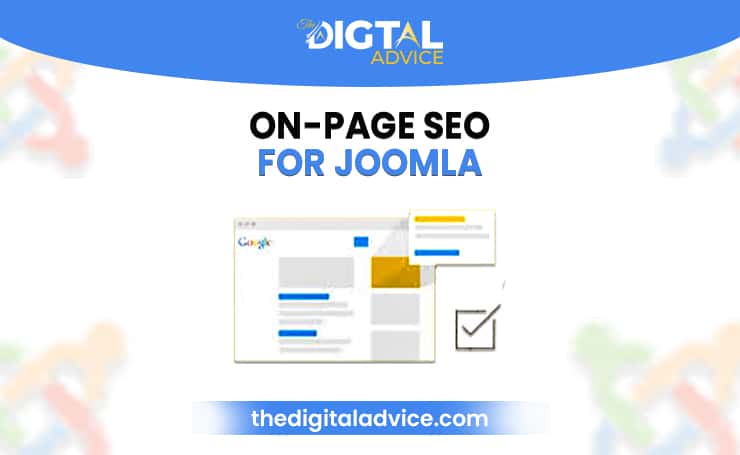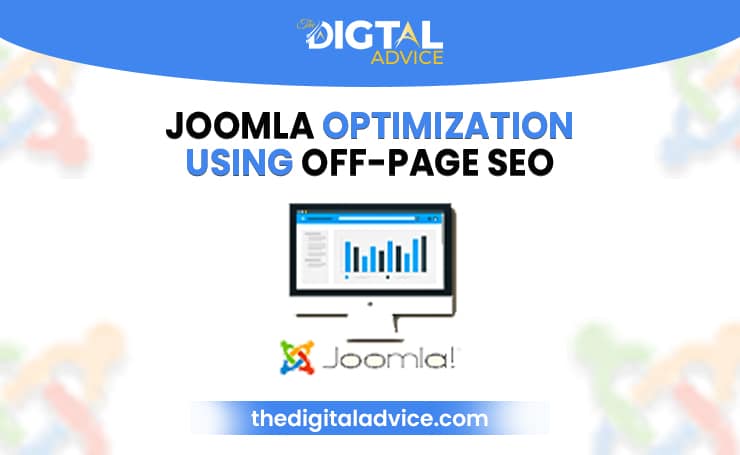What is Joomla?
Joomla is one of the top content management systems available online. The best thing about it is that it’s a free, open-source software. It is an award-winning CMS platform that helps you create websites and applications.
With Joomla, one can create a website without knowing coding, and not just that, it provides great community support. So if you want to make a small-scale business website, an ecommerce platform, online magazines, applications, or small websites for school or non-profit organizations, Joomla is your one-stop CMS platform that is free of cost.
Role of Joomla SEO in Websites’ Performance
After creating a website using the Joomla Content Management System, the major success of your website, e-commerce store, magazines, etc., lies in the most effective use of search engine optimization.
Every CMS or website builder needs to have SEO functions involved in it to make any online website or e-store successful.
There are several ways in which SEO impacts the performance of Joomla websites:
- SEO helps search engines understand the structure and the content of your website.
- Joomla SEO helps to rank your website high in SERPS.
- It helps to gain organic traffic. Organic traffic is free traffic, and this is the traffic that will last a long time because it is not the leads from paid ads that stop as soon as you stop the ad.
- Helps improve website speed and enhance its performance.
- Provides a better user experience to your visitors.
- Increase conversions on your stores and websites.
- Increases the rate of return of your visitors.
- Improved visibility of the Joomla website.
Joomla SEO and Performance Improvement
Joomla optimization is not a difficult job, once you understand what is SEO and how to do it for Joomla ranking.

Joomla provides some built-in features related to search engine optimization. Still, for more defined and effective optimization and higher ranking, we might consider some SEO Extensions for Joomla, which will be discussed in this blog post later on.
We shall discuss Joomla optimization by dividing it into two parts:
Built-in SEO Features of Joomla
There are many features built within Joomla that you need to work with in order to work on your Joomla website, and they directly or indirectly impact the optimization of your Joomla Website.
Search-Friendly URLs
URLs matter a lot. When your URLs are easy to read, they not only make it attractive but also provide a good user experience. A friendly URL comes right after your domain name, showing the intent of your web page to your audience and the search engines.
- Make sure your URLs only contain letters and you use a hyphen to separate words.
- Do not use underscores in your friendly URLs.
- They should be short and readable.
- Use your keywords in URLs to make search engines understand the intent of your page content.
With Joomla, we need to enable Friendly URLs using settings, which can be done as Follows:
- Log in and open the Joomla Administrator Panel
- From system settings, open Global configuration
- Look for the SEO settings section under the Site tab.
- Set the following options:
- Search Engine Friendly URLs: Yes
- Use URL Rewriting: Yes (requires .htaccess)
- Save these changes
SSL Certificate
An SSL Certificate is a very important ranking factor for search engines. It shows your
Visitors can see that the connection they are forming with your website is secure and
encrypted. Websites that have SSL enabled are preferred by search engines, making them highly likely to show up in search results and get ranked.
When it comes to setting up an SSL on a Joomla website, you will need to ask for one from your hosting provider. Once you have an SSL Certificate, you can install it in Joomla in the following ways:
- Log in to the Joomla Administrator Panel.
- Go to System and open Global Configuration.
- Click on the Server Tab.
- In the Server Tab, set FORCE HTTP to Entire Site.
- Save these settings.
This will ensure that each page of your website opens up with a secure HTTPS protocol, helping you increase the chances of getting ranked.
Enabling GZip Compression
A Gzip compression asks your server to compress your files before they are sent to Your users. What this does is increase the speed of your website, which is a high-ranking factor for websites and impacts your SEO indirectly through a better user experience and decreased bounce rate, directly impacting Joomla’s ranking through the search engine’s ranking algorithms.
To enable GZip compression, you must make sure that your hoster provides you with a compression system on your server. If you have the option available, then you can set up compression in Joomla following these steps:
- System → Global Configuration
- Open up the Server Tab.
- Set the Gzip Compression to yes.
- Save the settings to implement them.
Website Indexing
Your priority should be making sure that your Joomla website is indexed. Being indexed means it is searchable and visible in the search engine results. Non-indexed website will never make it to the SERPS, hence never getting ranked or visible.
Joomla automatically configures your website to be indexed. But you must check if your website is already indexed by default or not, just to avoid any risks.
To do so, the following steps are required:
- Open the Joomla Administrator Panel.
- System → Global Configuration.
- Open up the Metadata section.
- In the Robots section, make sure index & follow is set.
- Saves the changes and closes.
URL Trailing Slash
A trailing slash appears at the end of your URLs. Joomla allows a website to appear with or without a trailing slash. To give you an example, our URL has been shown both ways
below:
If you do not choose one from both, search engines may consider your pages as duplicates, causing harm to your SEO. To rectify this problem, one option should be considered, and all the URLs should be redirected to it.
A plugin named System – SEF has been introduced that you can access by logging in to your administrator panel.
- From System, click on Manage & then choose Plugins.
- Then, find the System – SEF plugin and click on edit to make changes to it.
- In the trailing slash option for URLs, choose either “Enforce URLs with trailing slash” or “Enforce URLs without trailing slash.”
After choosing one option, Joomla will automatically create redirects for the chosen option.
Redirecting Broken URLs
Broken links and 404 errors can badly impact your website’s SEO. Joomla, however, is of great advantage to help your website’s SEO by managing this using the Redirect
Manager. Or you could simply go to your Joomla Administrator panel, go to your plugin manager, and download the Redirect Plugin.
Within this plugin, you can add your broken link and add a new link where you want to redirect it, improving the site navigation and SEO.
Robots.txt File For Joomla SEO
Robot.s txt files are really essential for the SEO perspective of any website. This file basically guides the search engine crawlers for the pages they should crawl and those they should not. This way, crawlers only have access to your essential website pages, and they do not waste their crawl budget on unnecessary pages.

Joomla provides a built-in, pre-configured robots.txt file that disallows all the unnecessary files or folders that crawlers do not need to crawl or index.
The format of the Joomla Robots.txt file is as follows:
User-agent: *
Disallow: /administrator/
Disallow: /api/
Disallow: /bin/
Disallow: /cache/
Disallow: /cli/
Disallow: /components/
Disallow: /includes/
Disallow: /installation/
Disallow: /language/
Disallow: /layouts/
Disallow: /libraries/
Disallow: /logs/
Disallow: /modules/
Disallow: /plugins/
Disallow: /tmp/
This does not let crawlers go for unnecessary system and administrator directories, which makes this ideal for your website from an SEO & indexing point of view. You can also make changes in the file if required.
On-Page SEO for Joomla
Now that we have discussed some features that can be used directly within Joomla to help you with your SEO, let’s have a look at how you can do SEO on your Joomla website to make it rank high and reach the maximum traffic threshold.

Using SEO Friendly Template
Although there are so many templates available in Joomla, you must make sure that you are using the template that resonates with your brand image, and that does not contain elements that slow down the speed of your website.
Use a template that is well-coded and is very lightweight because this will impact the loading speed of your website, which is a high-ranking factor for search engines.
Keyword Research
Keywords are the backbone of any business website. And as far as Joomla ranking is concerned, you must choose a great strategy with keywords. When it comes to finding keywords, the strategy will be almost the same for any Joomla website.
Key points to consider for keyword search are:
- Study your competition and study your target audience’s search intent.
- Use tools or websites like Ubersuggest, Ahrefs, Google Keyword Planner & Semrush to find the best keywords for your website.
- Do not just focus on the high-ranking keywords; try to include keywords with low search volume as a strategy to rank for them in the near future, when searches around them will start increasing.
- Similarly, incorporate some zero search keywords in your blog posts as well that you feel may have search potential in the future. This way, if you are the only one using those keywords, you may get ranked for them on the first page of SERP if they start getting search volume in the future.
- Choose one primary keyword for your posts, and then also choose three to four secondary keywords for the same topic that you can target. Try to use secondary keywords two to three times each, and the primary keyword density should be around 1 to 2 percent.
- Do not stuff your keyword. Use them wisely in a way that they blend with your topic and do not look forced.
Titles and Meta Descriptions
Titles and metadescriptions are also really important for your Joomla ranking and SEO. Meta descriptions do not link directly with SEO, but they can still provide a call to action to your audience and help you get more clicks and visits to your website. Try to keep your metadescription between 120 and 160 characters.
Your title, on the other hand, plays a vital role as it appears in your SERPs. Make sure that your title includes your main keyword and that it is between 55 and 65 characters.
Mobile-Friendly Website
As per Statista, almost 62 percent of the website traffic is from mobile devices. Mobile devices are the primary source being used by people around the globe to search online and also for making purchases online.
Search engines consider a mobile-friendly website ideal for rankings, and being mobile-friendly is a high-ranking factor for Joomla ranking of your Joomla website or store. Therefore, you must choose a template that can be easily customized for mobile devices as well and loads faster on mobile devices. This will improve your ranking, directly impacting your SEO.
Fast Joomla Website Speed
A fast website not only provides a better user experience, but it also improves your SEO. A fast website reduces bounce rates, improves user experience, and helps generate user engagement, which in turn boosts the ranking of the website because a fast-loading website is considered a ranking factor by Google.
You can use websites like Pagespeed Insights & GTmetrix to analyze the speed of your website and see where it needs improvement.
To ensure your Joomla website is always loading fast, you can consider the following points:
- Use lightweight templates
- Keep your Joomla updated to make sure its functionality is at an optimal level.
- Clean up unnecessary data from your Joomla database.
- Compress large images and reduce their size so that they do not slow down your page loading speed.
- Enable Joomla cache to reduce the load on the server by helping this option store the static version of your pages to increase the delivery speed.
- Uninstall or remove unused extensions.
Structured Data
Always use structured data for your Joomla website. You can improve your Joomla ranking by using structured data, such as highlighting their prices, reviews, or
specifications to get themselves rich snippets and click-through rates, which can improve their visibility in the SERPS.
Structured data helps search engines understand the structure of your content and website, hence enhancing the SEO of your Joomla website. This improved SEO by the use of schema markup (Structured Data), which also helps to increase the authority of the Joomla website.
High Quality Content
Producing high-quality content is fundamental for the SEO of your Joomla website. High-quality content that adds value, quotes factual information, and also adds more
to the already available information online, shows the search engines that your website is providing value to the users and hence makes you an ideal choice for ranking in the SERPS.
Ergo, you must always consider that you research well before putting out your blog post or product descriptions using the information that is valuable and adds more to the already available information to increase your chances of ranking, enhancing your SEO along the way.
Optimized Images
Images impact the page loading speed a lot. If you are using a lot of images in your posts, then you must make sure that you are using either responsive images that adjust
To different screen sizes or you can use different plugins or extensions within Joomla to help you compress the size of your images for proper optimization. The faster a page with images loads, the better the chances of your rankings.
Image Alt Text
Keeping SEO in mind for Joomla, you must also make sure that you use alternate text for your images.
- Alt text works as an accessibility feature to help the audience with visual impairment understand the image’s context using screen readers.
- It helps to show image descriptions for those who have low internet speed and images cannot be loaded.
- Image descriptions and alt text also help the search engines to understand the context of your images, and using keywords in the alt text or description of your images can also help you to index your photos, which is excellent for your SEO.
Internal Linking
Internal linking is when you use the links of your older posts within your new posts, guiding your users towards them. Internal linking, when done rightly, not only increases
user engagement on your website but also helps crawlers to understand the structure of your website and improve your overall SEO by crawling and indexing it efficiently.
Updating Old Content
This might serve you as a bonus tip. Never ignore old content on your website. As much as it is essential to enrich your Joomla website with new content, it is also important to keep updating your old content. When you update your old content with the new information, and you show the date of modification of this content within your Joomla website, your users build more trust in you and your website, and they keep coming back when they need updated information.Joomla provides a modification date option in the article options, making it very easy for you have to use the feature and show your content update status to your new and old website visitors.
Joomla optimization using Off-Page SEO
Off-page SEO for Joomla ranking is as vital as the on-page SEO. One must put equal efforts into off-page SEO for a Joomla website to rank as much as their efforts in on-page SEO.

Building Backlinks
Building backlinks is a very important factor for the ranking of a website and off-page SEO. These are the external links that one website gets from the other when they mention the other website link on their website.
When you get backlinks from well-acknowledged websites, this improves your domain authority, and Google and other search engines consider your domain authority and backlinks as a ranking factor.
- Always consider getting backlinks from high authority websites.
- Use guest posting for high authority websites in return for a backlink.
- Try to connect with famous influencers in your niche and request them to share your link on their social media channels or websites. This will not only get you quality backlinks, but also a new audience from other influencers’ social media.
Social Media Integration
Integrate your Joomla website or store with your social media handles. Build the online reputation of your website by marketing it on your social media handles and promoting it.
Technical SEO for Joomla Optimization
Technical SEO for Joomla would involve Friendly URLs, Structured Data, Duplicate content, SSL Certificate, etc. Since we have already discussed them in detail in the Built-in SEO features of Joomla, under this heading, we would like to shed light on a vital technical approach of integrating your Joomla website to Google Search Console & Google Analytics.
- Once your website has been created, consider generating the sitemap for your website and then manually indexing it to Google Search Console.
- A sitemap is the map of essential pages of your website. Even though search engines can find and index your pages after crawling them, by manually indexing your sitemap, you can speed up the process of indexing.
- You can generate a free XML sitemap using websites like Sitemaps Generator, or you can download and use SEO Extension for Joomla that automatically generates and updates your sitemap.
- Although Google is considered the major search engine, you must also submit your sitemap to Bing Webmaster Tools to further elevate its growth across different search engines.
- Consistently monitor your Joomla website SEO and overall performance using tools like Google Search Console, Google Analytics, Ahrefs & Semrush. This helps you to find any prevailing issues in a timely manner and fix them, keeping your SEO working efficiently all the time.
Local SEO of Joomla Website
If your business is physically present locally, then you must do its local SEO. If you own a Joomla website that targets a location-specific audience to sell a service or product, then you can effectively use your location as a niche and Local SEO strategy by targeting your customers using your location data within your website.
You can use keywords related to your location and target your local audience. You can also register yourself with Google My Business & put the information of your business, especially the location, in the footer of your website.
Local SEO can help you rank easily, too. Use keywords related to local SEO and location within your website, and optimize your contact page with local information, too. This is going to help your website and business a lot.
SEO Extensions For Joomla
Although Joomla provides adequate SEO features and you can carry out most of the SEO practices manually by yourself, there are still various SEO extensions for Joomla that can be very crucial for increasing the visibility of your website online in SERPS, increasing the chances of your ranking.
There are so many extensions to choose from, but we are going to English five SEO Extensions for Joomla that we find are valuable and worthy of downloading and enhancing the SEO of your Joomla website:
JSitemap
This extension helps you to create advanced HTM & XML sitemaps. It is a premium extension. It produces and updates your sitemap, and not just that, it provides analytics on your SEO and can be integrated with Bing Webmaster Tool and Google Search Console.
IJoomla SEO
Ijoomla provides keyword monitoring, manages Meta tags for you, and makes your on-page optimization really easy by cutting 95 percent of your SEO time.
EFSEO (Easy Frontend SEO)
It helps developers to control their metadata directly from the front end of the Joomla Website. It helps with the manual setting of metadata, and it can be helpful for editors and content managers who do not wish to navigate the backend data.
sh404SEF
sh404SEF is one of the most powerful SEO extensions for Joomla websites. You can handle canonical tags, manage your metadata, remove duplicate content on your website, manage 404 errors, and create search engine-friendly URLs using this extension.
4SEO
It is a comprehensive SEO extension that helps you manage the optimization of your website. It provides:
- Automated metadata
- Automated structured
- sitemap Generation
- Google Search Console Integration
- Social media optimization
Final Remarks
Joomla is an award-winning Content Management System, which is a free open license program that helps users create websites that are SEO friendly and can be managed in a way that allows them to rank high in SERPS when optimized with best SEO practices, including the built-in features of the CMS and the extensions provided by Joomla.
With the best Joomla SEO practices, one can scale the growth of their website along with their own SEO practices done at the On-Page, Off-Page, Technical, and Local SEO levels.
This blog post has provided you with every detail that you needed for the complete SEO of your Joomla website. Following all the above-mentioned SEO practices, you can be assured of the success of your Joomla website and its ranking.
If you wish to know about other CMS platforms’ SEO, too, then why not read our blog post on the Ultimate WordPress SEO Guide?
Do let us know if you want to learn more about Joomla Website Management & SEO.
Is Joomla still being used in 2025?
Yes, Joomla is still as necessary and as popular as it was in its initial years. Thousands of users globally use Joomla for their websites.
Is SEO on Joomla easy?
Joomla consists of built-in features like SEO-friendly URL, robots.txt file, 404 redirection, etc. Other than that, it has many SEO extensions that make your SEO journey with the website really easy and successful.
Do I need coding knowledge to create a Joomla website?
No, you can create a website using Joomla without any technical knowledge or coding.
How long does it take Joomla SEO to work?
It can take any website and CMS platform three to six months to generate results based on effective SEO.
How to optimize Joomla for mobile SEO
You can choose mobile-friendly themes, use responsive images, enable mobile caching and regularly run Google’s mobile-friendly tests.
Yes, Joomla is still as necessary and as popular as it was in its initial years. Thousands of users globally use Joomla for their websites.
Joomla consists of built-in features like SEO-friendly URL, robots.txt file, 404 redirection, etc. Other than that, it has many SEO extensions that make your SEO journey with the website really easy and successful.
No, you can create a website using Joomla without any technical knowledge or coding.
It can take any website and CMS platform three to six months to generate results based on effective SEO.
You can choose mobile-friendly themes, use responsive images, enable mobile caching and regularly run Google’s mobile-friendly tests.






